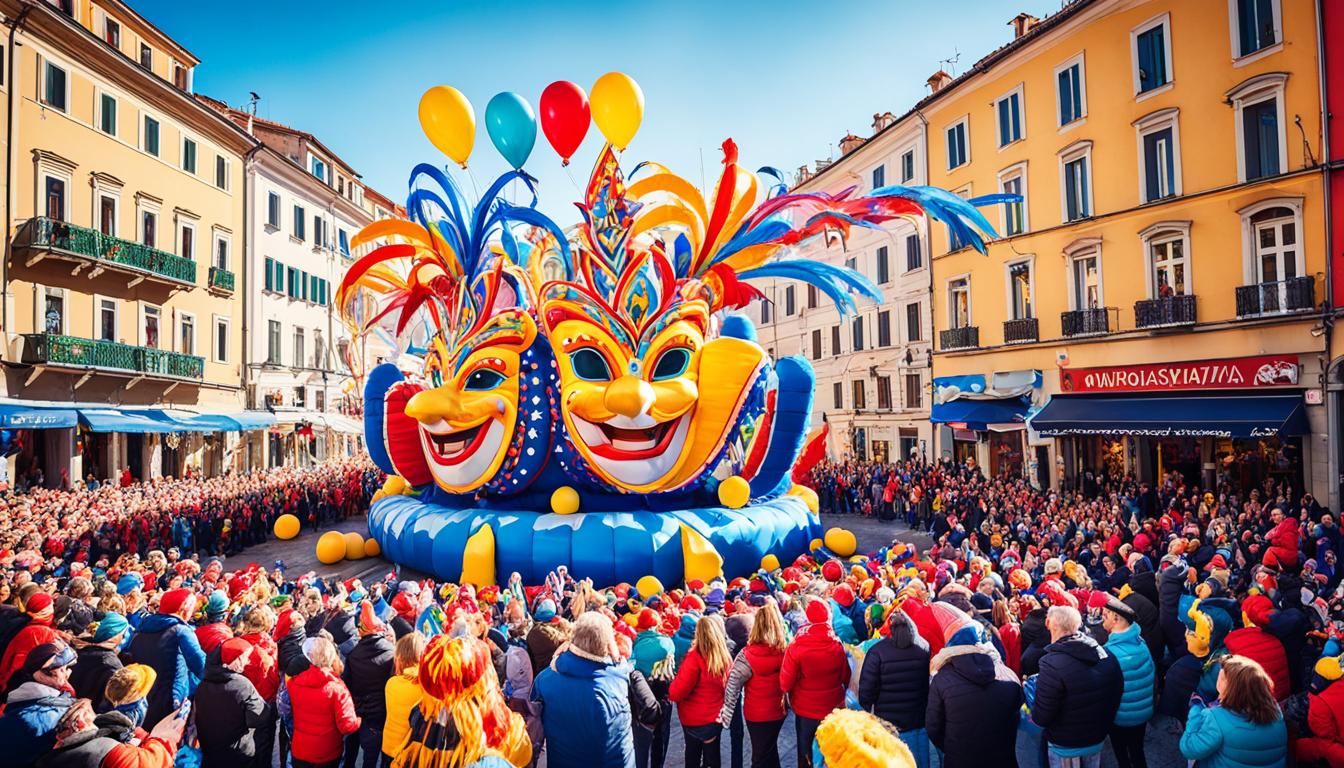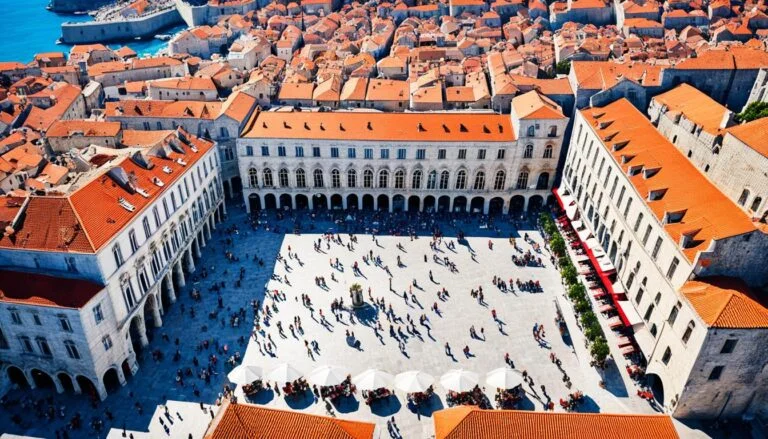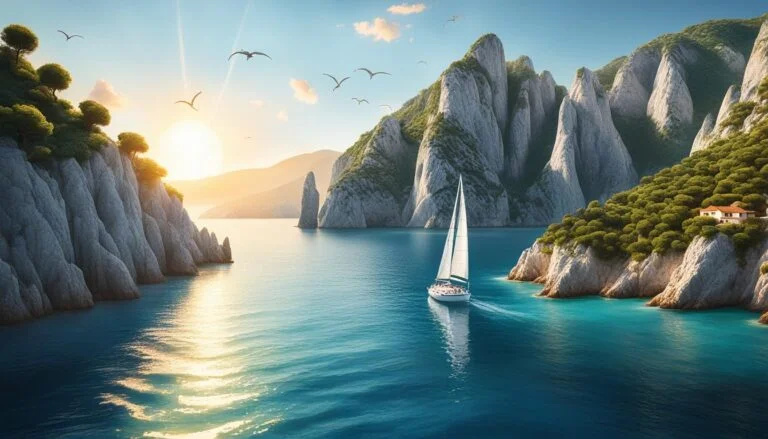5 Exciting Croatian Cultural Festivals You Need to Experience!
What if you could immerse yourself in Croatia’s vibrant cultural tapestry, exploring the country’s rich traditions through captivating festivals? From the iconic Rijeka Carnival to the Visualia Festival’s breathtaking light displays, Croatia’s festival scene offers a gateway to the heart of the nation’s customs and celebrations1.
Croatia is a country brimming with cultural treasures, and its diverse festival calendar showcases the best of the nation’s heritage. Whether you’re drawn to lively parades, captivating performances, or mouthwatering local cuisine, these five must-visit Croatian cultural festivals promise an unforgettable immersive experience1.
Key Takeaways
- Croatia’s cultural festivals offer a unique glimpse into the country’s vibrant traditions and customs.
- From parades and performances to culinary delights, these events provide an immersive experience for visitors.
- The festivals range from long-standing celebrations like the Dubrovnik Summer Festival to newer additions like the Visualia Festival.
- Attending these festivals allows you to connect with the local community and gain a deeper understanding of Croatian culture.
- These events are not to be missed for anyone seeking to explore the authentic heart of Croatia.
Captivating Carnivals and Vibrant Celebrations
Croatia is renowned for its captivating carnival celebrations, and none is more iconic than the Rijeka Carnival2. This vibrant festival is one of Europe’s largest and most vibrant carnival events2, attracting thousands of visitors each year to witness its grand procession of participants wearing elaborate masks and costumes2. The Rijeka Carnival showcases the spirit of fun, creativity, and community2, kicking off the year with a dazzling display of revelry and merriment.
The origins of the Rijeka Carnival can be traced back to the 1800s when it was celebrated by the Hapsburgs3. However, the carnival was later revived in 19822, and it now stands as a testament to Croatia’s rich cultural heritage3. The festival’s centerpiece is the International Carnival Parade, which takes place on the last Sunday of February and lasts the entire afternoon, captivating spectators with its vibrant displays.
Interestingly, the Rijeka Carnival also features the UNESCO-listed zvončari3, local men dressed in animal skins who chase away evil spirits by clanging huge cowbells3. This unique tradition, rooted in pagan and Christian influences3, adds an extra layer of authenticity and cultural richness to the festivities3.
From the grand processions to the captivating traditions, the Rijeka Carnival embodies the vibrant spirit of Croatia’s carnival celebrations2. Whether you’re drawn to the elaborate costumes, the lively music, or the sense of community, this festival is a must-experience for anyone exploring Croatia’s rich cultural tapestry2.
Croatia Cultural Festivals: Illuminating Traditions

Croatia’s cultural festivals extend beyond just carnivals, showcasing the country’s deep-rooted traditions and customs4. Every March, the historical center of Zagreb is transformed into a canvas for breathtaking light installations and projections during the Zagreb Festival of Lights5. Using the latest lighting technology, artists from around the world create stunning displays that illuminate the city and celebrate the arrival of spring.
Another unique festival is the Spring Procession of Ljelje/Kraljice (Queens) in the small village of Gorjani45. On Pentecost Sunday, girls dress in elaborate traditional costumes, parade through the village, and perform songs and dances accompanied by local musicians, preserving a centuries-old ritual6. This festival is unique to the Baranja, Slavonia, and Syrmia regions, reflecting Croatia’s rich cultural heritage and traditions.
The Zagreb Festival of Lights and the Spring Procession of Ljelje/Kraljice are just two examples of the diverse cultural festivals that showcase Croatia’s vibrant traditions45. These events not only entertain visitors but also preserve the country’s cultural identity and celebrate the arrival of new seasons, making them must-see experiences for anyone exploring Croatia’s rich cultural tapestry456.
Thrilling Knights’ Tournaments and Cultural Showcases

Croatia’s cultural festivals not only celebrate the country’s vibrant heritage but also feature thrilling displays of its historical traditions. The Sinjska Alka, held in the town of Sinj, is a captivating knight’s tournament that has been commemorating the Croatian victory over the Ottoman Turks in 1715 for over 300 years7. Skilled local horsemen, known as alkars, gallop along a course at high speeds, attempting to hit a ring called the alka with their lances, showcasing their extraordinary equestrian skills7.
Meanwhile, the Dubrovnik International Summer Festival, Split Summer Festival, and Zagreb Summer Festival offer a platform for Croatia’s rich performing arts heritage. These prestigious events feature classical music, drama, opera, and ballet performances throughout the summer months, allowing visitors to immerse themselves in the country’s cultural traditions7.
These cultural festivals not only captivate audiences but also serve as a means of preserving and showcasing Croatia’s unique identity. From the thrilling Sinj Games of Chivalry to the renowned performing arts festivals, these events provide a window into the country’s enduring traditions and offer an unforgettable experience for all who attend7.
Conclusion
Croatia’s cultural festivals offer a diverse and immersive glimpse into the country’s vibrant heritage8. From the iconic Rijeka Carnival and Zagreb Festival of Lights to the traditional Sinjska Alka tournament and Spring Procession of Ljelje/Kraljice, these events provide a unique opportunity for visitors to experience the authentic customs and celebrations that have shaped Croatia’s identity8. Whether you’re drawn to the lively parades, captivating performances, or delectable local cuisine, these festivals promise to leave a lasting impression and deepen your appreciation for Croatia’s rich cultural tapestry9.
The country’s thriving festival scene is a testament to the enduring traditions and creative spirit that define Croatia8. From the ancient Roman Arena hosting the Pula Film Festival to the centuries-old Sinjska Alka tournament, these events seamlessly blend the past and present, offering a dynamic and immersive cultural experience8. As Croatia continues to captivate visitors with its diverse array of festivals, it invites you to immerse yourself in the vibrant celebrations that celebrate the heart and soul of this remarkable nation10.
Whether you’re seeking to indulge in the flavors of Croatian cuisine, witness the pageantry of traditional music and dance, or simply bask in the energy of lively parades and performances, Croatia’s cultural festivals provide an unparalleled opportunity to connect with the country’s heritage9. As you plan your next adventure, consider exploring the wonders of these festivals and let them inspire a deeper appreciation for the rich tapestry of Croatia’s cultural identity89.







